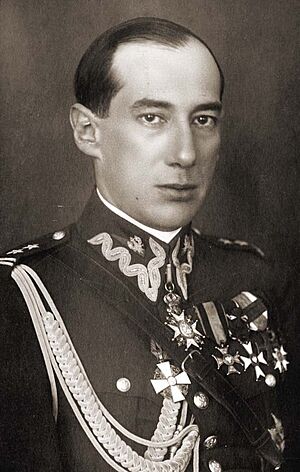Józef Beck facts for kids
Quick facts for kids
Józef Beck
|
|
|---|---|
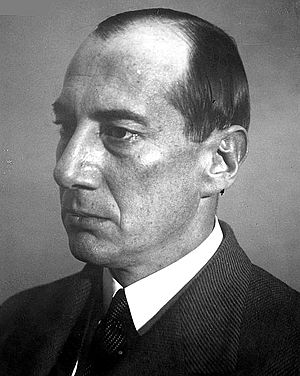 |
|
| Minister of Foreign Affairs | |
| In office 2 November 1932 – 30 September 1939 |
|
| President | Ignacy Mościcki |
| Prime Minister | Aleksander Prystor Janusz Jędrzejewicz Leon Kozłowski Walery Sławek Marian Kościałkowski Felicjan Sławoj Składkowski |
| Preceded by | August Zaleski |
| Succeeded by | August Zaleski |
| Personal details | |
| Born | 4 October 1894 Warsaw, Congress Poland, (then part of Russian Empire) |
| Died | 5 June 1944 (aged 49) Stănești, Romania |
Józef Beck (Polish: [ˈjuzɛv ˈbɛk]; 4 October 1894 – 5 June 1944) was an important Polish leader. He was a diplomat and military officer for the Second Republic of Poland. Beck worked closely with Józef Piłsudski, another famous Polish leader. He is best known for being Poland's foreign minister in the 1930s. He played a big role in shaping Poland's foreign policy.
Beck tried to make Poland a leader of a group of countries in its region. However, other governments often disliked and distrusted him. Poland was located between two powerful and unfriendly countries: Germany and the Soviet Union. Beck sometimes tried to get along with them. Other times, he stood up to them. He hoped to use their disagreements to Poland's advantage. Later, he formed an alliance with the United Kingdom and France. Both of these countries declared war on Germany after it invaded Poland in 1939. When the Soviet Union also invaded Poland, Beck and his government moved to Romania.
Contents
Early Life and Career
Józef Beck was born into a Protestant family. His ancestors had moved to Poland from Flanders in the 1500s. When World War I started, Beck was studying engineering. In 1914, he joined a secret group called the Polish Military Organization. This group was founded by Piłsudski. Beck served in the First Brigade of the Polish Legions and was an aide to Piłsudski.
After Poland became independent again, Beck became an artillery commander. He also worked for the General Staff. From 1922 to 1923, Beck was a military representative in France. The French did not like Beck and even spread false rumors about him. In 1926, he helped with a military takeover that brought Piłsudski to power.
From 1926 to 1930, Beck was the chief of staff for Poland's Minister of Military Affairs. Then, from 1930 to 1932, he was Vice Prime Minister and Vice Minister of Foreign Affairs. Piłsudski prepared Beck to handle Poland's foreign policy. In 1932, Beck became the Minister of Foreign Affairs. He held this job until World War II began.
Foreign Minister: Poland's Challenges
Beck faced a difficult situation. Poland had a large population of 35 million people. However, its industries were not very strong. Its army of 283,000 soldiers was not well-equipped. They lacked artillery and modern machines, relying a lot on cavalry. Poland also shared long borders with two powerful dictatorships: Hitler's Germany and Stalin's Soviet Union.
Historian Richard Overy wrote that among the new countries in Europe, Poland was "almost certainly the most disliked." Its foreign minister, Beck, was "the most distrusted." By the end of 1938, Poland had few close friends because it tried to follow its own path. Other Western countries saw Poland as a country that wanted more land. They also thought it was unfair, against Jewish people, and too friendly with Germany. They saw Beck as "a menace," someone who was arrogant and untrustworthy.
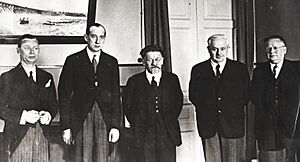
In his international dealings, Beck tried to keep a careful balance between Poland and its two powerful neighbors. In July 1932, he signed a non-aggression agreement with the Soviet Union. In January 1934, he signed a similar agreement with Germany.
Beck felt it was unfair that Poland and Czechoslovakia had to protect their German minorities. But Polish minorities in Germany and the Soviet Union were not protected in the same way. He also disliked that countries like Germany used the Minorities Treaty to interfere in Poland's internal affairs. In September 1934, Beck ended Poland's involvement in the Minorities Treaty. This happened after the Soviet Union joined the League of Nations.
After Piłsudski died in May 1935, a few leaders shared power in Poland. These leaders included General Edward Rydz-Śmigły, President Ignacy Mościcki, and Beck himself. These three men mostly controlled the Sanacja (Sanation) group. They ruled Poland together until World War II started. Beck had a lot of freedom to decide Poland's foreign policy. However, personal disagreements weakened the ruling group. None of the three men fully took charge in the late 1930s.
Beck's Strategic Ideas
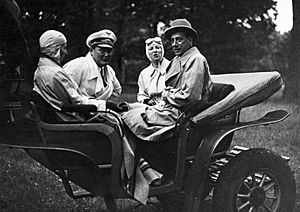
Beck did not trust the League of Nations. He did not think it could help Poland. France wanted to work with Poland but did not trust Beck. So, he looked for new ideas. He thought about Piłsudski's idea of Międzymorze ("Between-seas"). This was a plan for a group of central and eastern European countries. It would stretch from the Baltic Sea to the Black Sea. Some versions even included areas from the Arctic Ocean to the Mediterranean. Such a group might be strong enough to stop both Germany and the Soviet Union from attacking.
Beck knew that building such a large group was not possible right away. So, in 1937–1938, he tried to create a smaller group called "Third Europe." This group would be led by Poland. It could become the start of a Międzymorze federation. Beck's "Third Europe" idea included Poland, Italy, Yugoslavia, Hungary, and Romania.
However, his efforts did not succeed for several reasons:
- Both Italy and Hungary preferred to be allies with Germany, not Poland.
- Romania and Hungary had a disagreement over Transylvania. This made it impossible to include them in a common group.
- Italy and Hungary both wanted to divide Yugoslavia. This stopped any efforts to include Rome, Budapest, and Belgrade in an alliance.
- None of the other four countries wanted Poland to lead the "Third Europe" group.
From 1935 to 1939, Beck supported Germany's claims against Czechoslovakia. He said that Polish minorities in Czechoslovakia were being treated badly. In January 1938, he publicly demanded that Poles in Czechoslovakia get the same rights as Germans. In 1937, Beck also started to support Slovak independence. He supported Hitler's position in the Munich agreement in 1938. A few days later, Poland took over Teschen. This was an industrial area of Czechoslovakia with many ethnic Poles.
1939: Germany's Invasion Plans
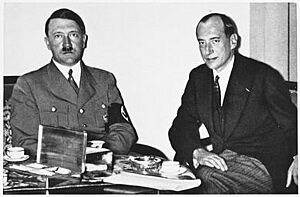
In 1937, Hitler kept telling Beck that Germany had no claims on Danzig. But in early 1939, Hitler changed his mind. He now claimed Danzig and said that military force would not be used.
Beck played a very important role in early 1939. He strongly refused Hitler's demands to make Poland a German puppet state. Hitler wanted Poland to give up important lands to Germany. He also wanted Poland to join the Anti-Comintern Pact, which was against the Soviet Union. Beck said no to Hitler's demands for Polish Pomorze (Pomerania). Giving up this land would have cut off Poland's access to the sea and its main trade route. This would have made Poland's economy dependent on Germany.
He also refused demands for a special rail and highway corridor. This corridor would run to East Prussia and the Free City of Danzig. In return, Hitler offered vague promises about trade and taking over lands in the Soviet Union. Hitler had been planning to take Polish land for several years. By early September 1939, he decided to go ahead with his war plans.
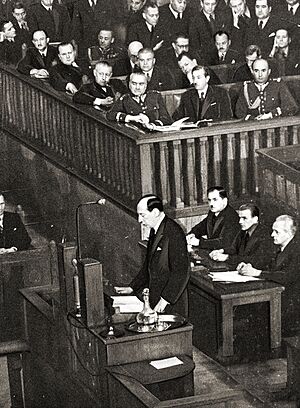
Beck was surprised when Britain announced in March 1939 that it would defend Poland from a German attack. France also offered its support. However, both countries knew they could do little if Germany invaded Poland.
In April 1939, Beck was in London to discuss an aid treaty with Britain. Beck famously spoke about his refusal of German demands on 5 May 1939:
Peace is a precious and a desirable thing. Our generation, bloodied in wars, certainly deserves peace. But peace, like almost all things of this world, has its price, a high but a measurable one. We in Poland do not know the concept of peace at any price. There is only one thing in the lives of men, nations and countries that is without price. That thing is honor.
Beck also refused a request from the Soviets. They wanted to send their forces into Poland. This request was made during talks that Poland was not part of. A third offer soon followed from Britain. It promised support to the Polish government if Poland's borders were in danger. This time, Beck accepted it. According to Joseph E. Davies, the Polish government did not fully understand how strong the German military was.
Because of this, Hitler focused his diplomatic efforts on the Soviet Union. He secured the German-Soviet alliance in August 1939. This alliance was known as the Molotov–Ribbentrop Pact. It gave Germany Soviet support in a war. It also promised a lot of Soviet food and oil. The pact also included an agreement to divide Poland and the Baltic states. By this time, many people realized that war between Germany and Poland was very close.
World War II and Later Life
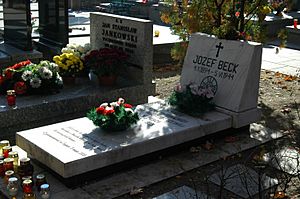
Germany invaded Poland on 1 September 1939. This marked the start of World War II. Beck called on Poland's allies, France and Britain, to join the war to help Poland. Even with their agreement, France and Britain did little to directly help Poland. However, both countries declared war two days after the German invasion.
On 17 September 1939, the Soviet Union attacked Poland from the east. Beck and the rest of the Polish government moved to Romania. In Romania, the authorities held him at a hotel in Brașov. While there, he wrote a book of his memories called Ostatni raport (Final Report).
Melchior Wańkowicz, a well-known Polish journalist, met Beck in the autumn of 1939. He described the meeting:
Beck was held in a luxurious hotel in Brașov. He and his group stayed on one floor. He was watched closely. Whenever he went out, many agents from Allied, German, and Romanian sides followed him. I met him at 5 in the afternoon. Our talk lasted until almost two in the morning, with a dinner break. Beck highlighted his achievements from his last month in office. These included a military treaty with England. He also mentioned Hungary's refusal to let German troops pass through its land. He spoke of the right to stay and pass through, given by the Romanian government. Beck believed in a strong alliance. He thought Poland would sit at a negotiating table as partners. He believed the Czechs would not be included. He did not care that Lloyd George said Poland did not deserve help. He was not bothered that Lord Halifax wanted to bring back the Curzon Line. Instead, he pointed out that when the British king gave a speech, only the English, French, and Polish anthems were played. Since I cannot accept this kind of wishful thinking, I asked him if he had ever seriously thought about a German attack. He kept saying that he had met Hitler several times. He said Hitler would back out of discussions. He believed Hitler could easily be convinced to do different things. He also thought Hitler was influenced by von Ribbentrop.
Józef Beck died in Singureni, Romania, on 5 June 1944. He had developed tuberculosis. His son, Andrzej Beck, was active in the Polish community in the United States until his death in 2011.
In May 1991, Beck's remains were brought back to Poland. He was buried at Warsaw's Powązki Military Cemetery.
Honors
- French Legion of Honour in the grade of Chevalier (1923) and in the grade of Officier (1927)
- Order of Saint Sava I degree
Images for kids
-
Visit to Soviet Union, 1934. From right: Maxim Litvinov, Avel Yenukidze, Mikhail Kalinin, Józef Beck, Juliusz Łukasiewicz.
-
With Hermann Göring, 1935
-
Hitler and Beck, 1937
-
5 May 1939—Beck addresses the Sejm, rejecting Hitler's demands.
-
Graves of Józef Beck and Jan Jankowski, Powązki Military Cemetery, Warsaw
See also
 In Spanish: Józef Beck para niños
In Spanish: Józef Beck para niños
 | Madam C. J. Walker |
 | Janet Emerson Bashen |
 | Annie Turnbo Malone |
 | Maggie L. Walker |


